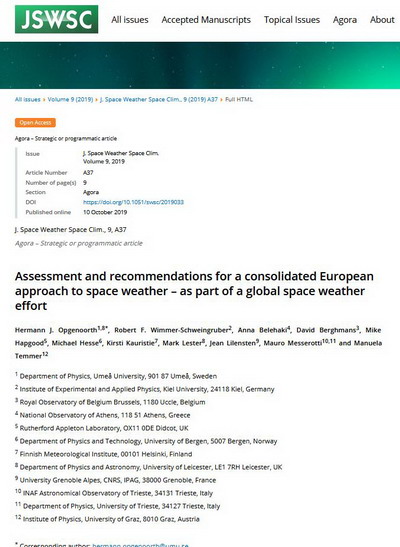Below it is possible to find the abstract and the corresponding link for an interesting research spearheaded by the European Space Science Committee (ESSC) of the European Science Foundation, about how to prepare Europe for the increasing impact of adverse space weather effects on man-made infrastructure and our society as a whole.
Abstract
Over the last 10–20 years there has been an ever-increasing international awareness of risks to modern society from adverse and potentially harmful – and in extreme cases even disastrous – space weather events. Many individual countries and even international organisations like the United Nations (UN) have begun to increase their activities in preparing for and mitigating effects of adverse space weather. As in the rest of the world there is also in Europe an urgent need for coordination of Space Weather efforts in individual countries as well as in and among European organisations such as the European Space Agency (ESA) and the European Union (EU). This coordination should not only improve our ability to meet space weather risks, but also enable Europe to contribute to on-going global space weather efforts. While space weather is a global threat, which needs a global response, it also requires tailored regional and trans-regional responses that require coordination at all levels. Commissioned by the European Space Science Committee (ESSC) of the European Science Foundation, the authors – together with ex-officio advice from ESA and the EU – have over two years assessed European activities in the realm of space weather and formulated a set of recommendations to ESA, the EU and their respective member states, about how to prepare Europe for the increasing impact of adverse space weather effects on man-made infrastructure and our society as a whole. We have also analysed parallel international activities worldwide, and we give advice how Europe could incorporate its future activities into a global scheme.
Read the full research at this link.
Source:
https://www.swsc-journal.org/articles/swsc/full_html/2019/01/swsc190036/swsc190036.html
